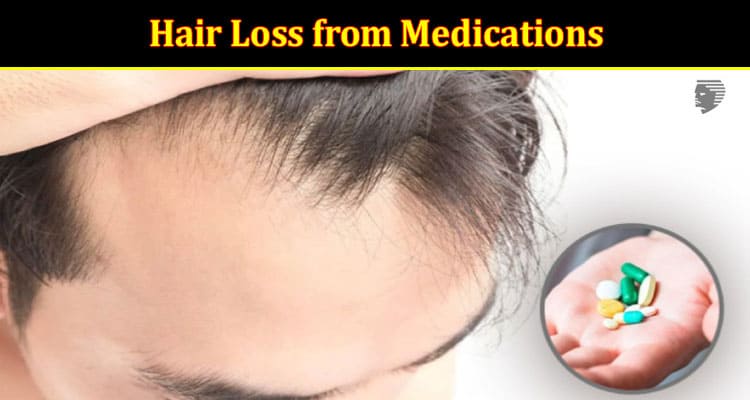Hair loss is an inevitable and distressing side effect of some medications.
Telogen effluvium is the most common form of hair loss due to medication.
Hair loss usually appears within 2 to 4 months after starting the drug.
Medicines like antidepressants, anticoagulants, birth control pills, and antihypertensives are known to cause hair loss in some people.
Not all people on these medicines experience Telogen effluvium.
Some ways can help you mitigate the effects of medication-induced hair loss.
Read this article to learn how medicines can cause hair loss and how to reverse it.
How do medicines cause hair loss?
Although designed to treat various health conditions, medications can sometimes have unintended side effects, including hair loss. This phenomenon is known as drug-induced alopecia.
Certain medications disturb the normal hair growth cycle, increasing hair shedding.
Not all medicines cause hair loss with the same mechanism. There are many common ways in which medicines can lead to this condition.
Some medicines can interfere with the hair follicles’ growth phase.
Hair follicles undergo a continuous cycle of growth, rest, and shedding. Some drugs can disrupt this cycle by prolonging the resting phase.
When more hair follicles enter the resting phase simultaneously, it leads to excessive shedding and noticeable hair thinning.
Another mechanism involves the alteration of hormone levels.
Some medicines can influence hormone production or interfere with the hormone receptors in the scalp.
Hormones play a crucial role in regulating hair growth, and any imbalances can disrupt the normal cycle, leading to hair loss.
Certain oral contraceptives, and hormone replacement therapies, can impact hair growth patterns.
Additionally, some medications can directly damage the hair follicles, leading to their miniaturization or even permanent destruction.
Cancer treatments like chemotherapy and radiation therapy, as these powerful treatments target rapidly dividing cells, including hair follicles.
It’s important to note that not all individuals will experience hair loss as a side effect of medications, and the severity can vary.
Consult your doctor, as they can suggest some ways how to reverse the hair loss, such as
Medication
If you have a health condition and your medicine is causing hair loss, your doctor might prescribe medicine to counter it.
Finasteride or Minoxidil are commonly recommended medications for treating hair loss.
Both of these medicines are popular and effective in treating Telogen Effluvium.
Check with your doctor before taking any of these medicines, as they are quite potent and can cause severe interactions if taken without proper consultation.
Diet
A balanced diet is one of the most essential things to support the growth and maintenance of healthy hair.
Medications can often cause nutrient deficiencies that can lead to hair shedding.
A diet rich in vitamins B, C, D, and E and minerals such as zinc and iron can promote hair growth.
A healthy diet can also strengthen hair follicles.
You can easily find these nutrients in leafy greens, nuts, seeds, fish, and eggs.
Consuming a balanced diet can help stop further hair loss and improve the hair’s health.
A healthy diet can also support the effectiveness of other treatments for medication-induced hair loss.
Proper hair care regimen
A proper hair care regimen can help treat medication-induced hair loss by maintaining the health of your hair. A hair care routine can also help promote new hair growth.
This includes,
- using gentle shampoos and conditioners
- avoiding heat styling tools,
- limiting chemical treatments
- use a wide-tooth comb or brush to prevent breakage
Regular scalp massages can also improve blood flow and stimulate hair growth.
A proper hair care regimen can improve your hair’s health and appearance.
A hair care regimen will depend on hair type, texture, scalp health, hair length, styling habits, environmental factors, and personal preferences.
These factors can impact the products and techniques to maintain healthy, strong, and beautiful hair.
Hair transplant and surgery
Hair transplant and surgery can be an effective options for treating medication-induced hair loss.
The transplanted follicles can continue to grow and produce hair in the new location.
Hair transplant surgery can provide natural-looking results and long-lasting hair growth.
Other procedures, like micro-needling, and non-invasive treatments like a red light for hair growth have also been successful in some cases. Check with your doctor if it is an appropriate treatment for your hair loss.
Conclusion
Medication-induced hair loss can be a challenging and frustrating experience for many individuals.
Due to their mechanism of action, some of the medicines cause hair loss.
They may cause hormonal levels to change or disrupt the hair growth cycle leading to hair shedding.
However, there are various options available to assist you in reversing the effects of medication-induced hair loss.
A balanced diet and proper hair care regimen can also help maintain the health of existing hair and stimulate new hair growth.
Medications such as Finasteride or Minoxidil can also effectively treat hair loss.
Hair transplant surgery can sometimes be a viable option to restore hair growth.
By working with a healthcare provider and exploring the various treatment options available, individuals reverse the effects of hair loss from medication.
Frequently Asked Questions
Will hair loss from medication grow back?
In most cases, hair loss from medication is reversible, and the hair will regrow once the medication is discontinued or if an alternative medicine is used. The hair will grow back in a few months with other treatment options, such as a balanced diet and medications.
Is hair loss from the pill permanent?
Hair loss from pills is not permanent and will stop once the individual stops taking the pill. However, hair growth may take several months to return to normal.
How can I reverse hair loss from medication naturally?
To naturally reverse hair loss from medication, one can follow a healthy diet rich in essential nutrients for hair growth, use gentle hair care products, avoid heat styling tools, and consider using hair growth supplements such as biotin or saw palmetto.

